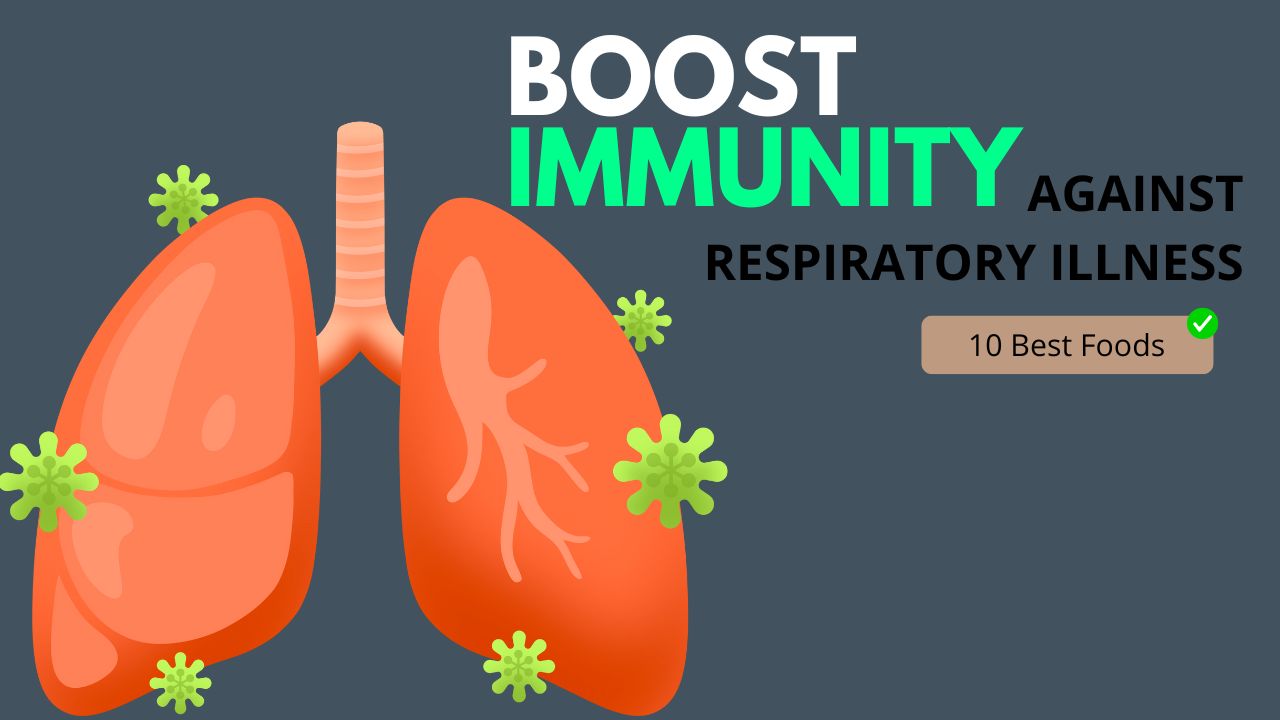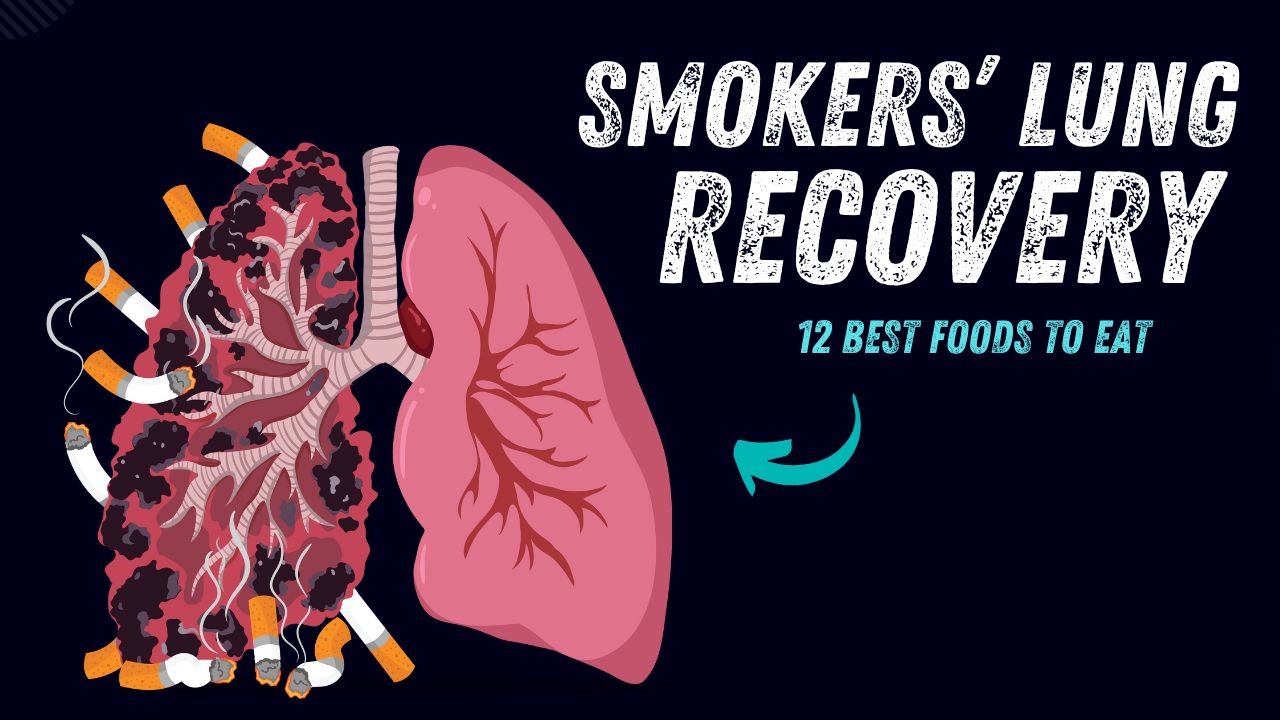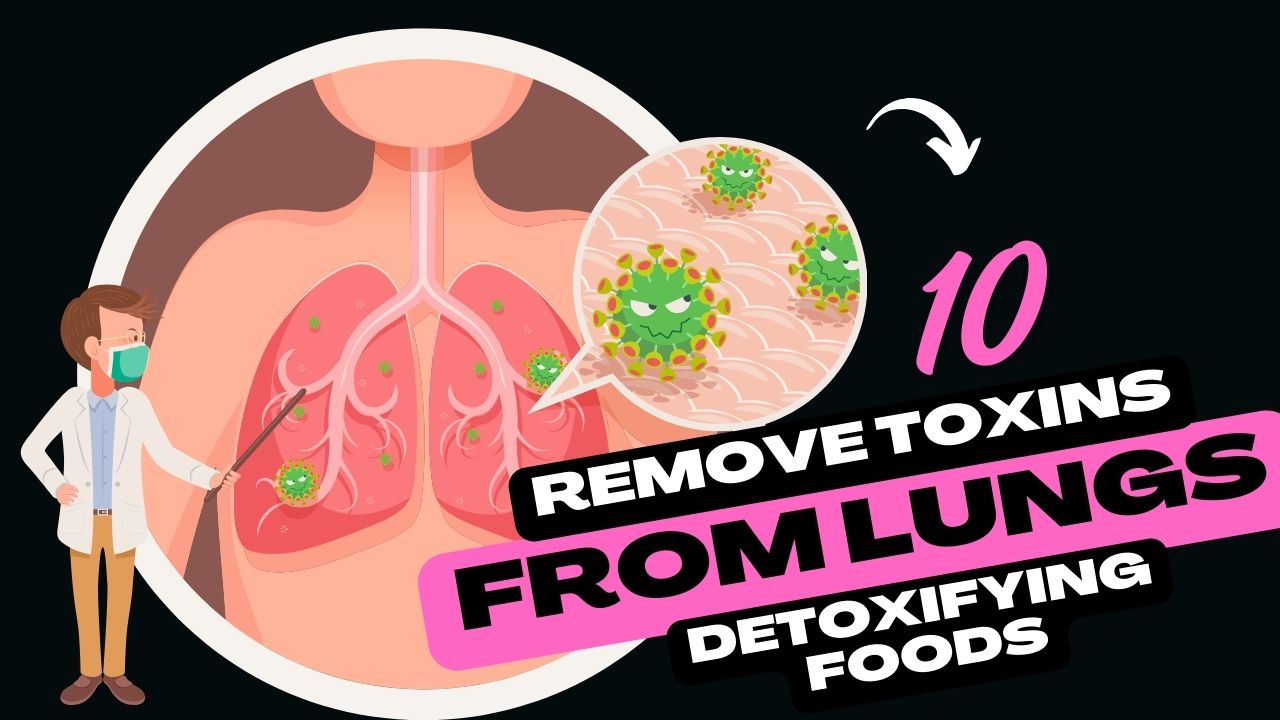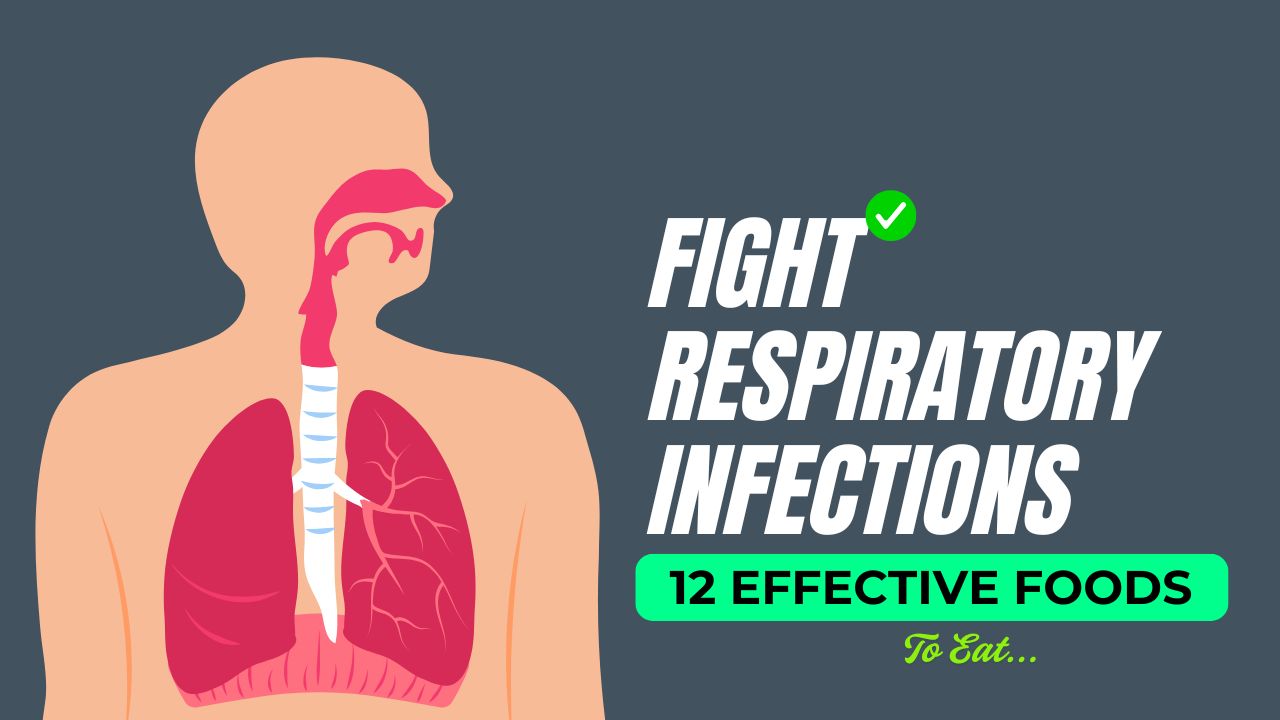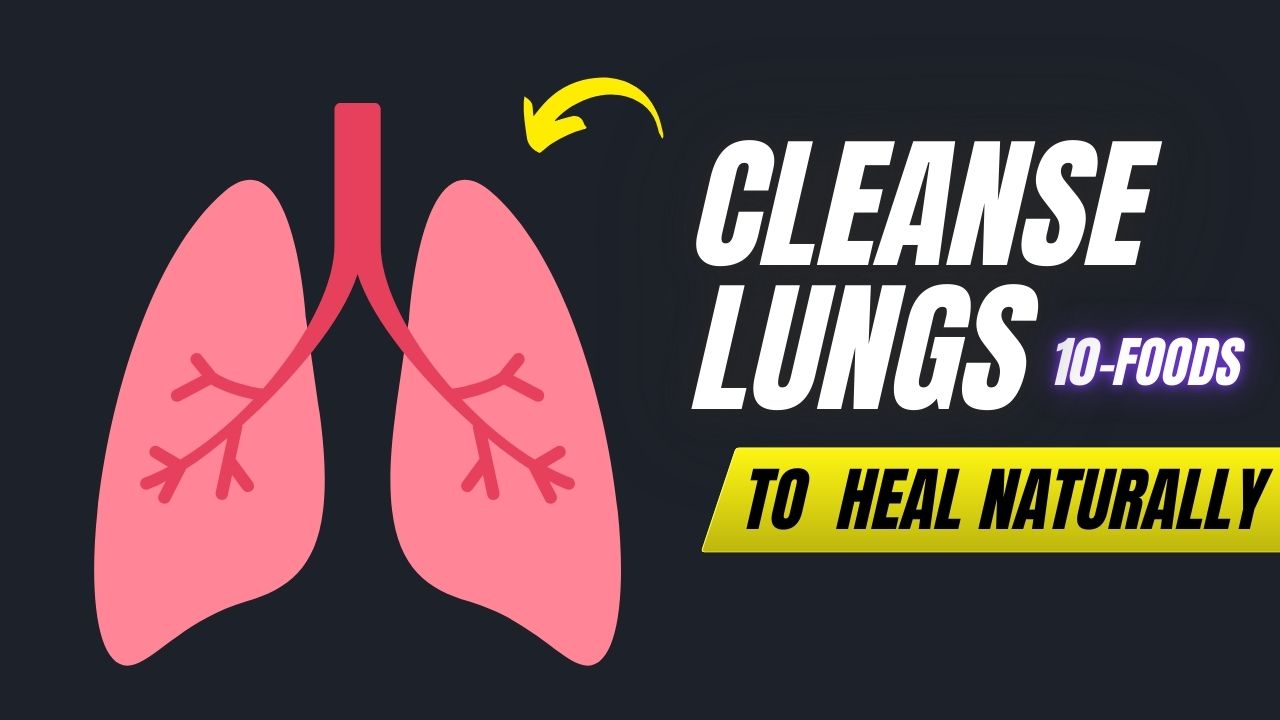Did you know that your immune system begins its battle against respiratory infections long before you notice a sore throat or blocked nose?
In fact, what you eat daily plays a powerful role in how well your lungs and immune defenses respond to bacteria and viruses.
Respiratory infections like colds, flu, bronchitis, or even pneumonia are among the most common health problems worldwide, affecting millions every year.
While medications and rest are often necessary for recovery, nutrient-rich foods can act as your natural shield against recurring infections.
In this post, we’ll uncover 12 powerful foods backed by science that can help strengthen your lungs, clear mucus, reduce inflammation, and support faster recovery from respiratory illnesses. We’ll also cover:
- The best ways to eat or use each food.
- Who should eat or avoid them.
- Smart storage and buying tips.
- Quick do’s and don’ts.
- Possible side effects (if any).
Let’s dive in and discover how these foods can become your natural allies for stronger lungs and better immunity.
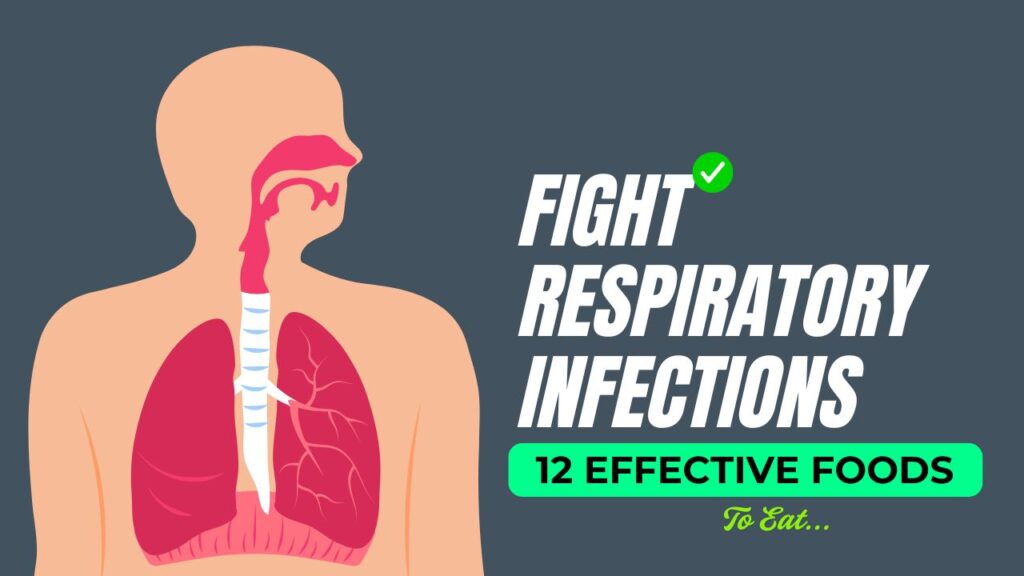
Table of Contents
12 Best Foods To Support Respiratory Infections
1. Garlic
Why It Helps
Garlic is often called “nature’s antibiotic.” Rich in allicin, garlic has antimicrobial and antiviral properties that can fight pathogens responsible for respiratory infections. It also reduces inflammation in the airways and supports immune cell activity.
Best Ways to Eat or Use It
- Eat raw in salads or mix with honey.
- Add to soups, stews, or stir-fries.
- Use roasted garlic as a spread.
Tip: Crushing garlic and letting it sit for 10 minutes before cooking enhances its allicin content.
Who Should Eat / Avoid
- Good for: people prone to frequent colds, those with weak immunity.
- Avoid/Limit if: you have bleeding disorders or are on blood-thinning medications.
Storage & Buying Tips
- Choose firm, tight bulbs with no sprouting.
- Store in a cool, dry place (not in the fridge).
Do’s & Don’ts
✅ Do: crush or chop for max benefits.
❌ Don’t: overcook at high heat (destroys active compounds).
Possible Side Effects
- May cause stomach upset in large amounts.
- Can thin blood if overconsumed.
2. Ginger
Why It Helps
Ginger is a natural anti-inflammatory and antioxidant. It helps reduce throat irritation, clears mucus, and supports better lung function. Some studies even show ginger may inhibit viruses that cause respiratory infections.
Best Ways to Eat or Use It
- Drink fresh ginger tea.
- Add grated ginger to stir-fries, soups, or smoothies.
- Combine with honey and lemon for sore throat relief.
Who Should Eat / Avoid
- Good for: people with congestion, asthma, or frequent sore throats.
- Avoid/Limit if: pregnant women (in excess), people with gallstones.
Storage & Buying Tips
- Pick firm, smooth roots with no wrinkles.
- Store in the refrigerator or freeze slices for longer use.
Do’s & Don’ts
✅ Do: use fresh ginger for maximum potency.
❌ Don’t: rely on ginger powder alone (less effective).
Possible Side Effects
- May cause heartburn or bloating in excess.
3. Citrus Fruits (Oranges, Lemons, Grapefruit)
Why It Helps
Citrus fruits are loaded with vitamin C, a powerful immune booster that shortens the duration of colds and strengthens respiratory health. They also contain antioxidants that protect lung tissues.
Best Ways to Eat or Use It
- Fresh juice or smoothies.
- Slices in salads.
- Add lemon to warm water for daily immunity.
Tip: Pair citrus with iron-rich foods (like spinach) to boost iron absorption.
Who Should Eat / Avoid
- Good for: kids, athletes, people prone to frequent infections.
- Avoid/Limit if: acid reflux sufferers (can worsen symptoms).
Storage & Buying Tips
- Choose firm, brightly colored fruits.
- Store at room temperature or refrigerate for longer shelf life.
Do’s & Don’ts
✅ Do: eat whole fruit (not just juice).
❌ Don’t: add excessive sugar to citrus juices.
Possible Side Effects
- Too much citrus can erode tooth enamel.
4. Turmeric
Why It Helps
Turmeric’s active compound curcumin has anti-inflammatory and antimicrobial properties that protect against infections and ease respiratory inflammation.
Best Ways to Eat or Use It
- Golden milk (turmeric + warm milk).
- Add to curries, soups, or rice.
- Turmeric tea with black pepper.
Tip: Combine turmeric with black pepper to enhance absorption of curcumin.
Who Should Eat / Avoid
- Good for: people with chronic respiratory issues like asthma or bronchitis.
- Avoid/Limit if: you have gallbladder problems or are on blood thinners.
Storage & Buying Tips
- Buy fresh turmeric root or organic powder.
- Store powder in airtight containers.
Do’s & Don’ts
✅ Do: use with black pepper.
❌ Don’t: overconsume supplements without doctor’s advice.
Possible Side Effects
- May cause digestive upset in large doses.
5. Honey
Why It Helps
Honey is a natural antibacterial and soothing agent that helps ease sore throats and calm coughs caused by infections.
Best Ways to Eat or Use It
- Take 1 teaspoon raw honey daily.
- Mix with warm water and lemon.
- Add to herbal teas.
Who Should Eat / Avoid
- Good for: children above 1 year, adults with cough.
- Avoid/Limit if: children under 1 year (risk of botulism).
Storage & Buying Tips
- Buy raw, unprocessed honey.
- Store in a glass jar at room temperature.
Do’s & Don’ts
✅ Do: use raw honey for best effect.
❌ Don’t: heat honey above 40°C (destroys enzymes).
Possible Side Effects
- Can raise blood sugar (diabetics should limit).
6. Spinach
Why It Helps
Spinach is rich in vitamins A, C, and E plus antioxidants and folate—all vital for immune health and lung protection.
Best Ways to Eat or Use It
- Fresh salads.
- Smoothies.
- Lightly steamed with garlic and olive oil.
Who Should Eat / Avoid
- Good for: children, elderly, people recovering from illness.
- Avoid/Limit if: kidney stone patients (high in oxalates).
Storage & Buying Tips
- Buy fresh, dark green leaves.
- Store in a breathable bag in the fridge.
Do’s & Don’ts
✅ Do: wash thoroughly.
❌ Don’t: overcook (loses nutrients).
Possible Side Effects
- May cause bloating in sensitive individuals.
7. Almonds
Why It Helps
Almonds are packed with vitamin E, which strengthens the immune system and helps fight infections.
Best Ways to Eat or Use It
- Eat raw or roasted.
- Blend into smoothies.
- Use almond butter as a spread.
Who Should Eat / Avoid
- Good for: athletes, children, people needing immunity boost.
- Avoid/Limit if: nut allergies.
Storage & Buying Tips
- Buy raw, unsalted almonds.
- Store in airtight containers.
Do’s & Don’ts
✅ Do: soak almonds for better digestion.
❌ Don’t: eat salted/flavored varieties excessively.
Possible Side Effects
- Excess consumption may lead to weight gain.
8. Green Tea
Why It Helps
Green tea contains catechins, which have antiviral and anti-inflammatory effects that support respiratory health.
Best Ways to Eat or Use It
- Brew fresh green tea.
- Add lemon and honey for flavor.
Who Should Eat / Avoid
- Good for: adults with weak immunity.
- Avoid/Limit if: pregnant women (too much caffeine).
Storage & Buying Tips
- Store tea leaves in airtight containers.
- Keep away from sunlight.
Do’s & Don’ts
✅ Do: steep for 2–3 minutes.
❌ Don’t: overbrew (can taste bitter).
Possible Side Effects
- May cause insomnia if consumed late at night.
9. Mushrooms
Why It Helps
Mushrooms like shiitake and maitake boost white blood cell activity, enhancing your body’s defense against infections.
Best Ways to Eat or Use It
- Add to stir-fries, soups, pasta.
- Grill or roast as a side dish.
Who Should Eat / Avoid
- Good for: vegetarians, immune-deficient individuals.
- Avoid/Limit if: allergies to fungi.
Storage & Buying Tips
- Buy firm, dry mushrooms.
- Store in paper bags in the fridge.
Do’s & Don’ts
✅ Do: clean gently with a damp cloth.
❌ Don’t: soak in water (absorbs too much).
Possible Side Effects
- Some wild mushrooms may be toxic—buy from trusted sources.
10. Yogurt
Why It Helps
Yogurt is rich in probiotics, which balance gut bacteria and indirectly boost immune responses to respiratory pathogens.
Best Ways to Eat or Use It
- Eat plain yogurt daily.
- Add fruits and nuts for extra nutrition.
Who Should Eat / Avoid
- Good for: children, adults, elderly.
- Avoid/Limit if: lactose intolerance.
Storage & Buying Tips
- Buy plain, unsweetened yogurt.
- Keep refrigerated.
Do’s & Don’ts
✅ Do: eat fresh, refrigerated yogurt.
❌ Don’t: choose sugary flavored versions.
Possible Side Effects
- May cause bloating in lactose-sensitive individuals.
11. Pomegranate
Why It Helps
Pomegranates are rich in antioxidants and vitamin C, helping fight inflammation and viral infections.
Best Ways to Eat or Use It
- Eat fresh seeds.
- Drink fresh juice.
- Add seeds to salads.
Who Should Eat / Avoid
- Good for: anyone wanting stronger immunity.
- Avoid/Limit if: on certain blood pressure medications.
Storage & Buying Tips
- Choose heavy fruits with firm skin.
- Refrigerate seeds in airtight containers.
Do’s & Don’ts
✅ Do: eat seeds fresh.
❌ Don’t: rely only on packaged juice.
Possible Side Effects
- May interfere with some medications.
12. Onions
Why It Helps
Onions contain quercetin, an antioxidant that helps clear mucus, ease breathing, and fight infections.
Best Ways to Eat or Use It
- Raw in salads.
- Caramelized in dishes.
- Onion soup.
Who Should Eat / Avoid
- Good for: people prone to sinus infections.
- Avoid/Limit if: acid reflux sufferers.
Storage & Buying Tips
- Keep in a cool, dry place.
- Don’t refrigerate whole onions.
Do’s & Don’ts
✅ Do: eat both raw and cooked.
❌ Don’t: store near potatoes (causes spoilage).
Possible Side Effects
- Can cause bad breath or stomach irritation.
Conclusion
Respiratory infections may be common, but with the right diet, your body can recover faster and even prevent them from recurring.
From the antimicrobial power of garlic and honey to the antioxidant richness of citrus and pomegranate, these 12 foods provide natural protection for your lungs and immune system.
Try incorporating at least two or three of these foods into your daily meals—whether it’s garlic in your soup, yogurt for breakfast, or a cup of green tea in the afternoon. Small, consistent changes can make a big difference in how resilient your body becomes.
Which of these foods have you tried when you felt under the weather? Share your favorite recipe or remedy in the comments below!
Frequently Asked Questions (FAQs)
Which foods are best for preventing respiratory infections?
Foods rich in vitamin C, antioxidants, and anti-inflammatory compounds—like garlic, ginger, citrus fruits, spinach, and mushrooms—help strengthen immunity and reduce the risk of infections.
Can honey really help with a cough or sore throat?
Yes, raw honey has natural antibacterial properties and can soothe irritation in the throat, helping reduce coughing and discomfort.
How should I eat garlic to get the most benefits?
Crush or chop garlic and let it sit for 10 minutes before cooking. Eating it raw or lightly cooked maximizes its active compound, allicin.
Are there any side effects of consuming these immunity-boosting foods?
Some foods may cause digestive discomfort, allergies, or interfere with medications. For example, too much citrus can erode tooth enamel, and raw garlic can thin the blood in high amounts.
Can children eat these foods safely?
Most are safe for children, but honey should not be given to children under 1 year, and large amounts of ginger or garlic should be moderated for younger kids.
How often should I include these foods in my diet?
Incorporate 2–3 of these foods daily for optimal immune support. Variety is key to getting a wide range of nutrients.
Are cooked vegetables as effective as raw ones for respiratory health?
Some nutrients, like vitamin C, are reduced by cooking, but lightly steaming or sautéing vegetables like spinach still provides significant benefits. Pairing them with healthy fats can enhance absorption.
Can these foods replace medicine for respiratory infections?
No, these foods support your immune system and may help prevent or shorten illness, but they do not replace professional medical treatment if infections are severe.
